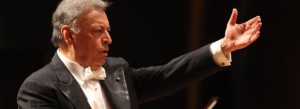Zubin Mehta magically turned a 50-year-old memory into an unforgettable golden moment for all who heard him conduct the Los Angeles Philharmonic at Walt Disney Concert Hall Dec. 13-16.
Imagine the memories that he must have of the organization, now developed into what could have only been a dream those 50 years ago. Flash back to 1962 with his first program as music director of the orchestra, a phenomenal young conductor thrust onto a fast track to unparalleled international fame via his fans in LA.
That first program was nearly replicated for this golden anniversary repeat, although the opening was punched up with the Busoni concert arrangement of Mozart’s overture to Don Giovanni substituting for the original. The rest of the program included a remarkable portrayal of Hindemith’s Symphony: Mathis der Maler (Mathias the Painter) and the energy-packed Symphony No. 7 of Dvorák.
Mehta’s intuitive connection of movement and emotion rendered his unique audeation to real sound. His movement was sublime, fueled by the automaticity of reflex and motion that one accrues over a lifetime of practice and understanding. At times, he would stand motionless after cues. He would lean back and pivot to lift his toe, his body a counterweight pulling the sound from the strings. His repertoire of gestures was smooth and finely calibrated.
Dressed in shades of gray from head to toe, with sharp, crisp lines, and a bold silver tie, he was a distinguished figure. His steps were deliberate, not rushed, almost formal in their cadence, and he started without hesitation upon assuming the scoreless podium.
Busoni’s concert arrangement of Mozart’s overture to Don Giovanni was consistent with the other works on the program with its larger format and expanded brass. The themes were Mozart, but this version sounded like a cover playing to the contrast of brass and strings. Mehta let Mozart and Busoni control the dramatic tension: he didn’t push it in tempo or amplitude, he seemed to just let it be.
Hindemith’s symphony was the high point of the afternoon on Dec. 16. The respect for this composer was palpable in Mehta’s manner; he had an intuitive grasp of the music that must have only been strengthened over the years. One cannot help but to wonder what the music means to Mehta now, colored by his own political actions and their recoils this half-century past.
The audience was a full house of super-fans, there to hear a global ambassador of tolerance, a conductor of conscience. His interpretation was as in-your-face decadent as it was meant to be. Grunewald’s Isenheim paintings sprang to life. Engelkonzert (Angelic Concert) beamed like a theatrical opening. The trombones were splendid in Es sungen drei Engel (Three angels were singing). The brightness of the orchestration was biting at times, contrasted with delicate undulations from the high winds and strings. Mehta led the Grablegung (Entombment) to an immense climax of churning energy, contrasting a chant-like woodwind sound with brassy bold exclamations. I had never before heard Hindemith in such an engaging performance.
Dvorák’s Symphony No. 7 was electrifying as the finale. The horns were especially tight. The orchestra was at its best, and Mehta let the energy ebb and flow into a fantastic climax. The synchrony was astounding, and the entire evening came together with an exuberant exclamation.
The arts in Los Angeles would not have developed in the same way without Zubin Mehta those many years ago. Thank you, Maestro.
~Theodore Bell/Culture Spot LA






